Imagine standing at the foot of the Pyramids, exploring a Marrakech souk, or trekking through the rain forests of Central Africa. These are trips that shape a lifetime, but for too long, the excitement of planning has been overshadowed by the headache of visa applications. The good news? Four of Africa's most compelling nations Morocco, Cameroon, Egypt, and the Republic of the Congo have given us a massive sigh of relief by launching or refining their Electronic Visa (eVisa) systems.
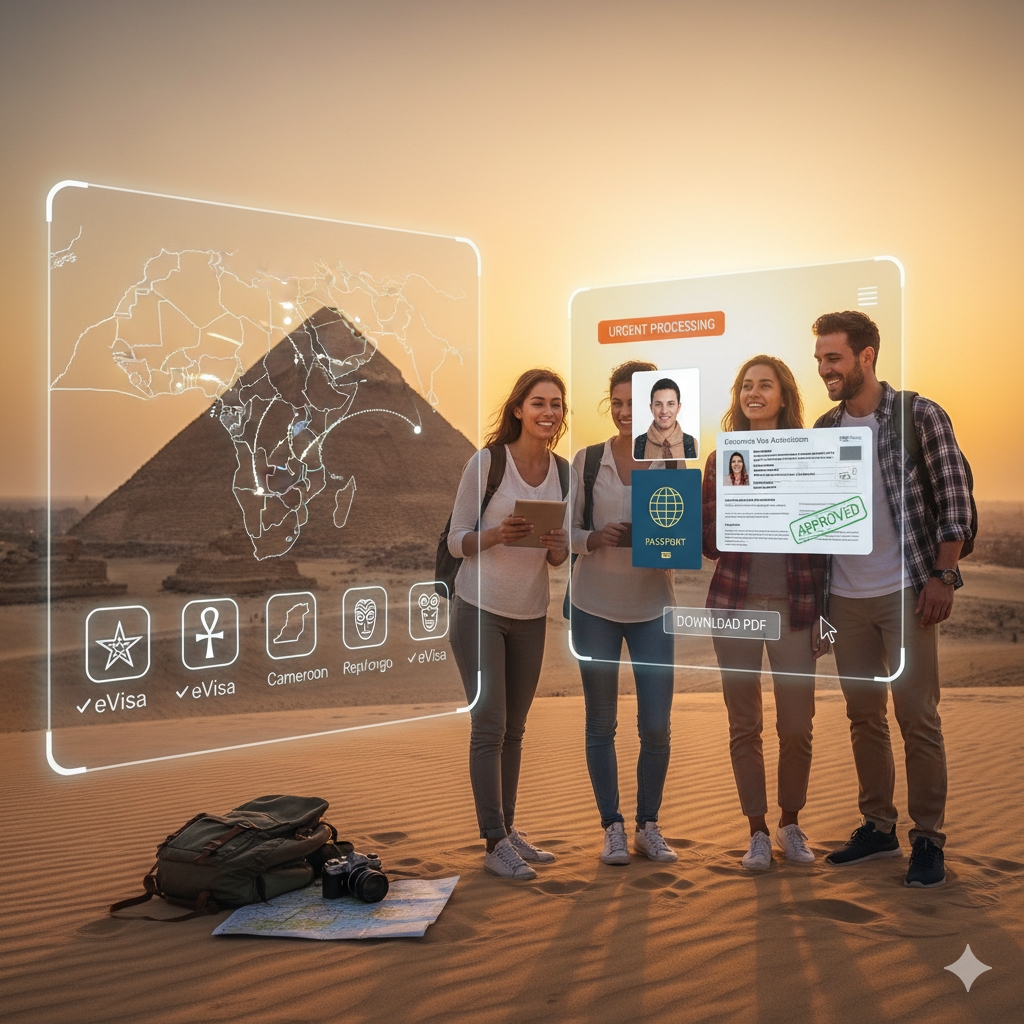
This isn't just a list of links; this ultimate guide is designed to be your indispensable field manual. We'll walk you through the precise eligibility rules, break down the specific eVisa types available, confirm the latest processing times, and help you skip the frustrating red tape, ensuring your focus stays exactly where it should be: on the adventure ahead.
Why Are African eVisa the Modern Traveler Best Friend?
Switching from traditional paper visas to digital eVisa is a monumental shift that fundamentally improves the travel experience for everyone involved. It's all about convenience, speed, and peace of mind:
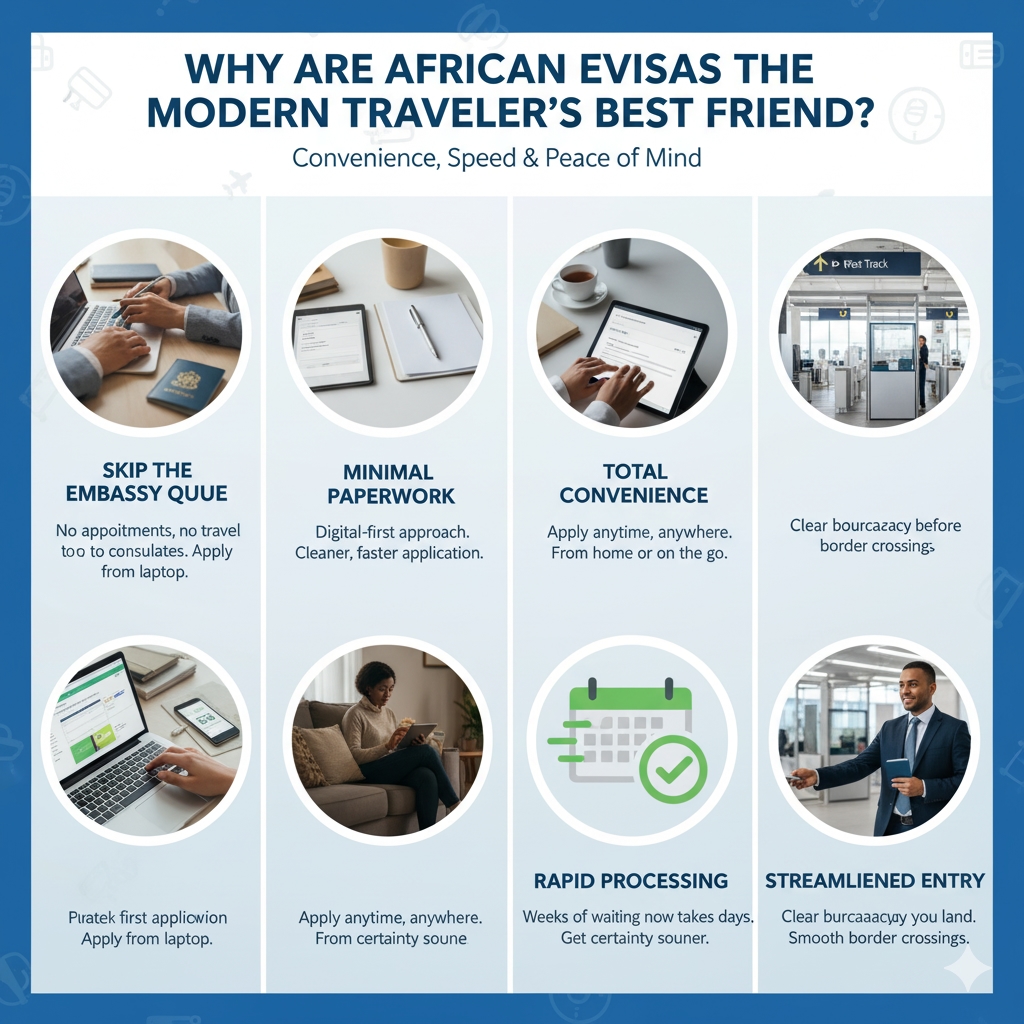
Skip the Embassy Queue: Forget scheduling appointments, traveling to consulates, or mailing off your passport. The process is handled entirely from your laptop.
Minimal Paperwork: The digital-first approach drastically cuts down on the physical documents required, making the application cleaner and faster.
Total Convenience: Apply late at night, early in the morning, or during your lunch break whenever and wherever it suits you.
Rapid Processing: What used to take weeks of nervous waiting now often takes only a few days, giving you certainty much sooner.
Streamlined Entry: By clearing the bureaucracy before you land, immigration authorities can process arrivals faster, promoting smooth border crossings and encouraging more visitors.
What Are the Morocco eVisa Eligibility Requirements and Processing Times?
Morocco’s launch of its eVisa program in July 2022 was a clear sign the country is serious about opening its doors to the world. It’s a beautifully simple, fully digital process: you upload your documents, pay the fee, and receive a printable PDF visa to present upon arrival.
Who is Eligible for the Morocco eVisa?
Eligibility is smartly designed to include two main groups:
Primary Nationals: Those holding passports from countries newly added to the eVisa list (e.g., India, Israel, Thailand, Jordan, and others).
The Power Pass Holders: Even if your nationality isn't on the primary list, you may qualify if you hold a valid residence permit or a long-term visa (minimum 90 days) from the USA, Canada, UK, Schengen Area, Australia, New Zealand, or Japan, provided you have resided there for at least six months.
How Long Does the Morocco eVisa Last?
Keep two crucial dates in mind when planning Moroccan eVisa for validity :
Overall Validity: The eVisa remains valid for 180 days (6 months) from the date it is issued. You must plan your entry into Morocco within this half-year window.
Maximum Stay: It is currently a single-entry authorization, permitting a maximum continuous stay of up to 30 days inside the country once you arrive.
Extension Potential: If you fall in love with Morocco, extensions are possible! You must apply at the local police or immigration office well before your initial 30 days expire, usually granting another 90 or 180 days depending on the circumstances.
Processing times are refreshingly fast, often ranging from 1 to 6 business days, depending on the priority service you select during application.
What Documents are Required for the Cameroon eVisa?
Cameroon eVisa for document requirement process is thorough, requiring careful preparation of supporting materials:
Passport biodata page (valid for a minimum of six months).
Proof of accommodation (a confirmed hotel booking or a signed, legally endorsed invitation letter from your local host).
Proof of onward or return flight itinerary.
MANDATORY: The International Yellow Fever vaccination certificate.
Travel requires notarized parental authorization and official birth certificates.
What is the Difference Between Short-Stay and Long-Stay Visas?
Cameroon offers duration options based on your trip's purpose:
Transit Visa: For brief layovers, allowing a maximum stay of 30 days.
Short-Stay Visa: Ideal for tourism and short business trips, allowing up to 180 days (6 months).
Long-Stay Visa: For extended work, study, or family settlement, allowing up to 360 days (1 year).
Standard short-stay processing usually takes around 72 hours, but a high-priority express 24-hour option is available for a fee.
How Does the Egypt eVisa Serve as a Gateway to Ancient Wonders?
Egypt offers one of the most accessible eVisa systems for many international visitors, providing a smooth digital alternative to the often chaotic Visa-on-Arrival process at the airport.
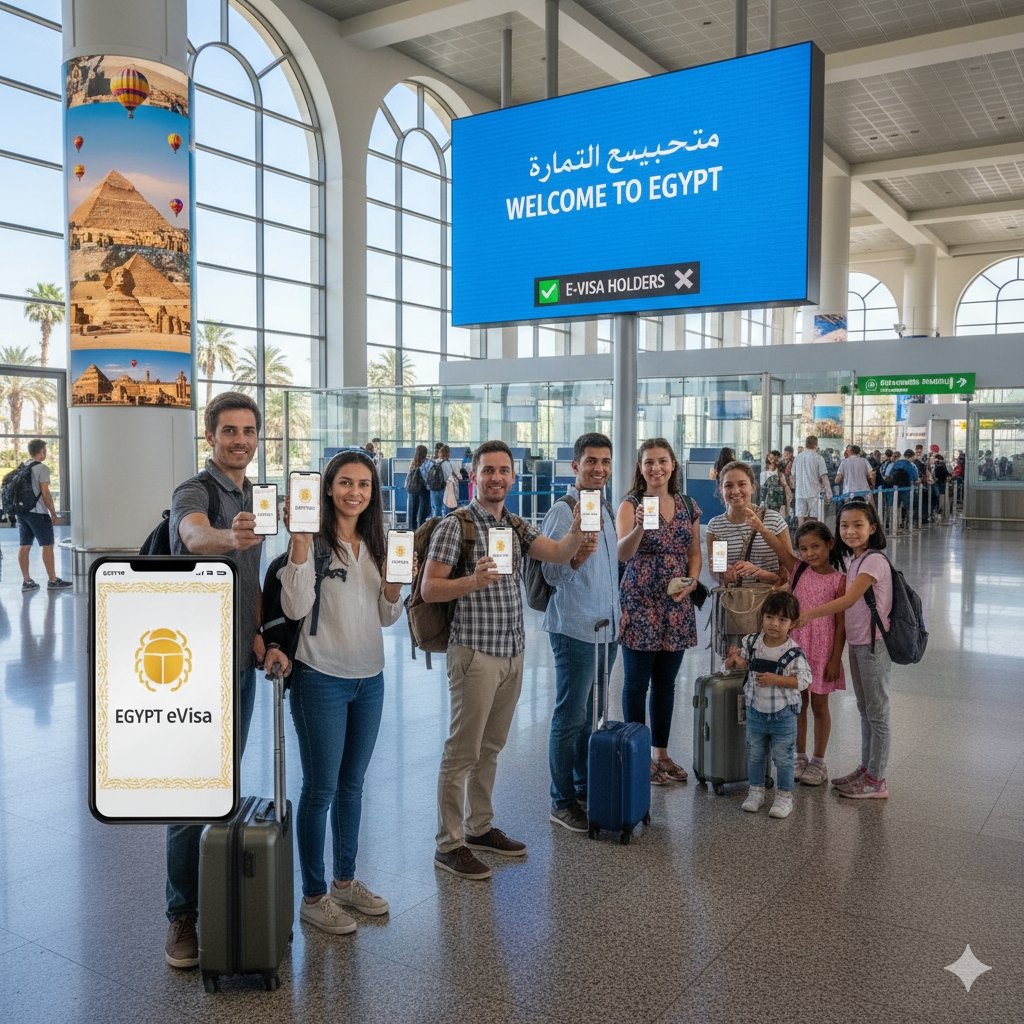
What is the Validity and Duration of the Egypt eVisa?
The Egypt eVisa Application is valid for 90 days from the date it is issued. You have two excellent options depending on your travel plans:
Single-Entry: Allows one continuous stay of up to 30 days. The typical government fee is approximately $25 USD.
Multiple-Entry: Perfect for travelers who plan to enter, leave for a short side trip (e.g., Jordan or Cyprus), and re-enter Egypt. This allows multiple entries, with each stay limited to 30 days. The government fee is around $60 USD.
What is the Application Processing Time and Fee for Egypt?
The official timeline for the government is up to 7 working days. However, most third-party services provide tiered options based on urgency:
Standard Processing: Typically 10 - 12 days.
Rush Processing: Reduces the wait to 7 - 10 days.
Super Rush Processing: Speeds things up to 5 - 7 days.
Our Advice: Always submit your application at least 7 days before your departure date, regardless of the tier chosen.
Is Visa-on-Arrival Still Available in Egypt?
Yes, for many nationalities, you can still purchase the physical visa sticker upon arrival USD . However, securing the eVisa beforehand is strongly recommended to bypass queues and ensure a seamless entry.
What Are the Steps, Requirements, and Types for the Republic of the Congo eVisa?
It is essential to clarify the country: we are discussing the Republic of the Congo ROC, or Congo-Brazzaville, which is separate from the Democratic Republic of the Congo (DRC, or Congo-Kinshasa). The ROC system is systematic and follows a clear Apply for Congo eVisa application process:
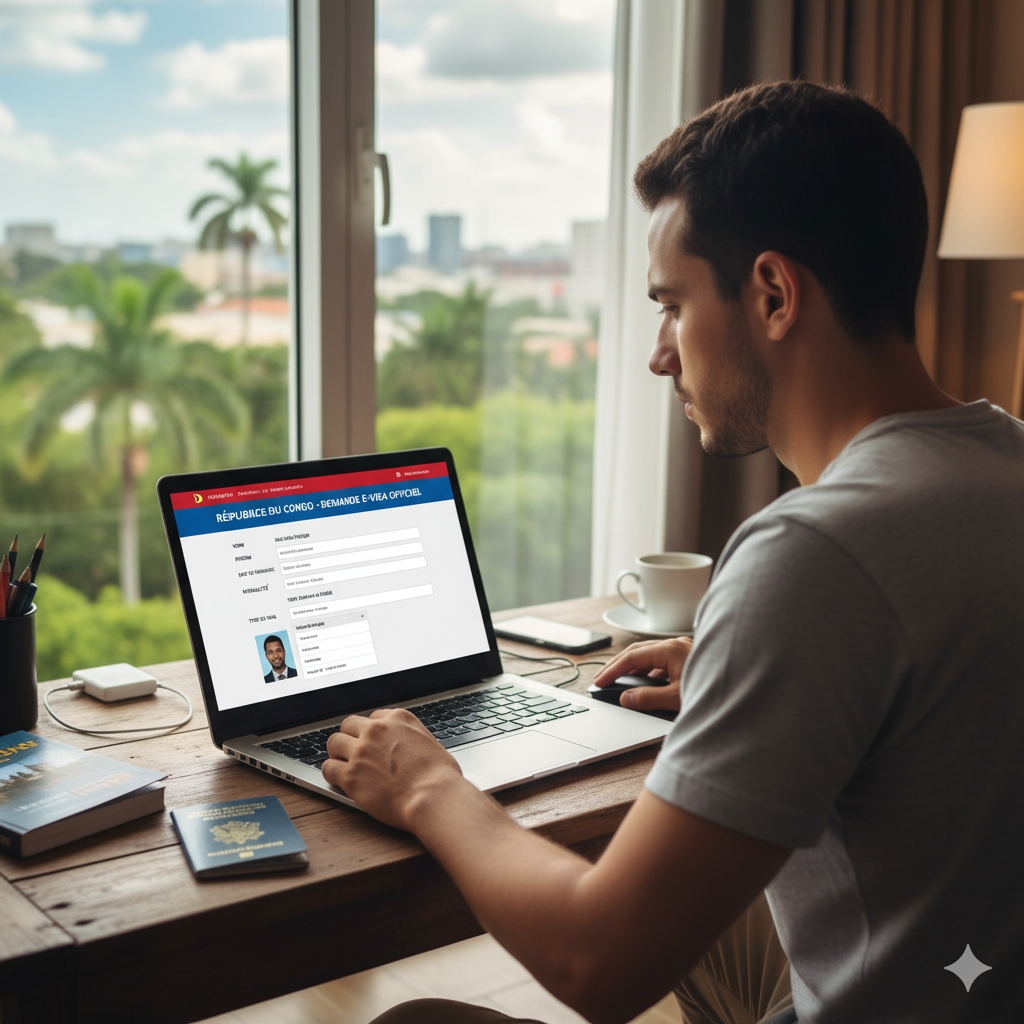
Account Creation: Register on the official portal.
Initial Application & Fee: Complete the form and submit the preliminary administrative fee.
Analysis: The application is reviewed, typically within 72 hours.
Final Fee & Download: If authorized, you pay the final visa fee and receive the official PDF eVisa document via email.
What Are the Three Main eVisa Categories for Congo-Brazzaville?
Congo-Brazzaville structures its electronic visas into three primary categories based on the intent of the traveler:
1. Specific Flying eVisa (Visa Spécial Vol)
Definition: Reserved for unique, short-term missions that do not fit into the typical tourist or business molds. This includes specific diplomatic tasks, journalistic assignments, or other highly verified non-routine activities.
2. Ordinary Flying eVisa (Visa Ordinaire Vol)
Definition: This is the most common and comprehensive category for standard travel, encompassing all general travel purposes:
Tourist eVisa: For travelers solely focused on leisure, exploring the city, and visiting natural reserves.
Business eVisa: For professionals attending meetings, conducting negotiations, or fulfilling company requirements. A formal letter of invitation from a Congo-based company is mandatory.
Transit eVisa: For those using Congo-Brazzaville as a hub to travel onward to another country. Maximum allowed stay is 30 days.
3. Family Visit Flying eVisa (Visa Visite Familiale Vol)
Definition: Designed specifically for travelers visiting immediate or close family members who reside legally within the Republic of the Congo.
Requirement: Requires a notarized and formally certified invitation letter from the host family member to prove the relationship and purpose.
What Are the Required Documents for Congo-Brazzaville?
Documentation is stringent and must be prepared accurately:
Original passport (must be valid for at least six months and contain two blank pages).
Confirmed round-trip flight itinerary.
Proof of accommodation (hotel booking or a notarized invitation letter, depending on the visa type).
Yellow Fever certificate (mandatory for all travelers).
What Are the Key Similarities and Differences in African eVisa Systems?
The modernization is consistent across these four nations, but smart travelers must recognize the subtle structural differences:
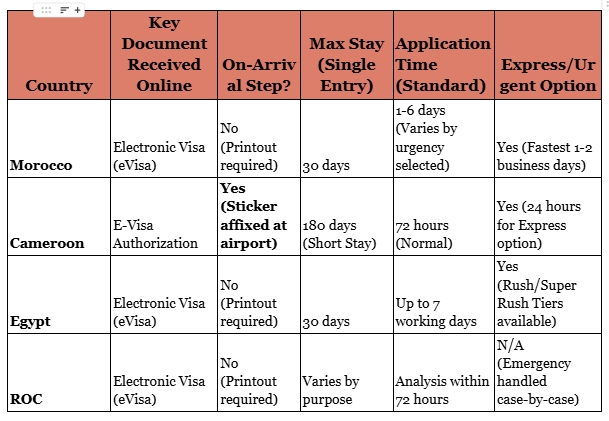
What Should I Do If My eVisa Application is Rejected?
A rejection is frustrating, but it rarely signals the end of your trip. It usually points to easily correctable technical issues, such as:
Passport Issues: The passport expiry date is less than the required six months' validity.
Sub-Par Document Quality: Uploaded documents (passport scan, photo) are blurry, have shadows, are cropped incorrectly, or fail to meet resolution standards.
Mismatched Data: Key details on the application form (like name spelling or birth date) do not exactly match the passport's biodata page.
If rejected, calmly review the official reason. In nearly all cases, you must correct the mistake and submit a completely new application, which means the application fee will be charged again.
How Can I Verify an Official African eVisa Website?
Protect yourself from fraudulent sites! This is critical for both your security and your wallet:
URL Verification: The address should always be clearly linked from the country's official government site, often ending in a domain like .gov, .gouv, or other official extensions.
Official Branding: Look for the country's official seal, flag, and the explicit logo of the Ministry of Foreign Affairs or Immigration Authority.
Secure Payment: Official portals utilize internationally recognized, secure payment processors.
Your First Step: Always use a search engine to find the country’s official Ministry or Directorate General website and navigate to the eVisa portal from there.
How Do I Get a Morocco Stay Extension?
Initial Limit: Tourists typically receive a 90-day window within a 180-day period; the eVisa grants a 30-day stay.
Extension Process: To push past that initial 30-day limit, you must apply at the local police station or the headquarters of the Sûreté Nationale (National Security).
Timing: Begin your application process well before the 30-day stamp expires.
Required Documents: You'll need your passport, copies, photos, proof of adequate funds, and confirmed accommodation details.
How Do I Get an Egypt Stay Extension?
Extension Process: Extensions are handled at the Egyptian Passport and Immigration Office (most famously the Mogamma al-Tahrir in Cairo, or regional offices).
Duration: The first extension is typically granted for three months.
Timing: Submit your application before your initial 30-day stay ends. If you miss the deadline, you will likely still get the extension but will incur an overstay fine upon departure.
Recommendation: Deal with the extension as soon as possible after landing, as these offices are often time-consuming.
How Do I Get a Cameroon Stay Extension?
Extension Process: If you need to extend a Short-Stay Visa (up to the 6-month maximum), the application must be submitted in person to the General Delegation for National Security (DGSN) headquarters in Yaoundé or a regional branch.
Requirement: Extensions are granted only with strong justification that the purpose of your original visit (business, research) has not been completed.
How Do I Get a Republic of the Congo (ROC) Stay Extension?
Formal Process: Extending a stay in Congo-Brazzaville is notoriously complex and highly bureaucratic.
Location: Applications are processed by the Direction Generale delay Police Nationale (DGPN).
Guidance: Due to the rigor of the requirements, it is highly recommended to seek professional assistance from a local lawyer or contact your embassy for guidance on extension requirements.
Is Yellow Fever Vaccination Mandatory for Entry?
This is not a matter of choice; it's a non-negotiable health requirement for specific countries. The Yellow Fever vaccination certificate (ICVP) is mandatory, but rules differ:
Cameroon & Republic of the Congo (ROC): The certificate is mandatory for all travelers aged 9 months and older, regardless of your origin country. It is a strict prerequisite for both the visa and border entry.
Egypt & Morocco: The certificate is not mandatory unless you are traveling directly from, or have transited for more than 12 hours through, a country with a risk of Yellow Fever transmission.
Traveler's Precaution: Always check the World Health Organization (WHO) advisories. The vaccination must be administered at least 10 days before arrival to be considered valid.
What is the Best Time to Apply for an eVisa?
Timing is everything in the visa world. Don't apply too early or too late:
The Early Mistake: Applying six months out for an eVisa with a 90-day validity means your visa will expire before your plane even leaves the runway.
The Procrastinator Panic: Relying solely on the minimum advertised processing time is a gamble; unforeseen delays happen.
The Safest Window: Target applying 1 to 2 months before your intended travel date. This gives you ample cushion for the standard processing time and allows you to resolve any application errors without major panic.
What Are the Tips for a Seamless Online Visa Application Process?
A successful application hinges on precision. Double-check these common pitfalls:

Exact Matching Data: Use names, dates, and passport numbers exactly as they appear on your passport no abbreviations, nicknames, or transposed digits.
Quality Scans: Use high-resolution scans for all documents (passport, photos, etc.). A blurry or poorly lit image is the fastest route to rejection.
Proof of Funds: Ensure your bank statements or letters clearly show you have sufficient financial resources for your planned trip.
What are the Different Entry Types (Single vs. Multiple)?
The choice between single and multiple entry depends entirely on your itinerary:
Single-Entry: Allows you to enter the country just once within the visa's validity. Once you leave, the visa is exhausted, even if you didn't use the full 30-day stay limit.
Multiple-Entry: Essential for regional travelers. This option allows you to enter and exit the country repeatedly during the visa's lifespan (e.g., 6 months or 1 year), provided each individual stay respects the maximum duration (usually 30 days). While more costly, it’s invaluable for business or multi-stop trips.
What Are the Key Considerations for Urgent Processing?
Premium Cost: Be prepared to pay a substantial additional fee, separate from the government visa cost.
Speed, Not Certainty: Paying extra accelerates the review time, but it does not guarantee approval. Rejections due to eligibility issues still occur, and the urgent fee is typically forfeit.
Justification: For extreme priority, have documentation ready—a confirmed flight itinerary within 48 hours or a letter detailing the emergency travel need.
What Are the Urgent Options by Country?
Cameroon: The Express Option guarantees review within approximately 24 hours, a significant leap from the standard 72 hours.
Egypt: Expedited tiers are common, such as Rush (7-10 Days) and Super Rush (5-7 Days), allowing you to bypass the standard 10-12 day wait.
Morocco: The fee structure allows applicants to select faster processing tiers, putting them on the fastest end of the 1 to 6 business days window.
Republic of the Congo (ROC): While no guaranteed paid-for express service is publicly advertised, truly urgent humanitarian or critical business requests may be prioritized if you contact the Directorate General directly.
Conclusion
The comprehensive move toward sophisticated, online Electronic Visa systems by Morocco, Cameroon, Egypt, and the Republic of the Congo is nothing short of a game-changer for international travelers. These systems effectively demolish the old bureaucratic hurdles, making the continent’s stunning historical sites, diverse wildlife reserves, and captivating cultures more accessible and easier to plan for than ever before.By treating this guide as your preparation checklist—understanding the nuanced visa categories, adhering strictly to the document quality requirements, and applying within the recommended time frame—you ensure your entry process is seamless and stress-free. With the eVisa securely in hand, the logistical worries fade away, and the focus shifts entirely back to the incredible, life-altering adventure that awaits you in Africa.
